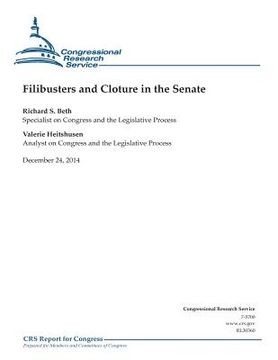Reseña del libro "Filibusters and Cloture in the Senate (en Inglés)"
The filibuster is widely viewed as one of the Senate's most characteristic procedural features. Filibustering includes any use of dilatory or obstructive tactics to block a measure by preventing it from coming to a vote. The possibility of filibusters exists because Senate rules place few limits on Senators' rights and opportunities in the legislative process. In particular, a Senator who seeks recognition usually has a right to the floor if no other Senator is speaking, and then that Senator may speak for as long as he or she wishes. Also, there is no motion by which a simple majority of the Senate can stop a debate and allow itself to vote in favor of an amendment, a bill or resolution, or most other debatable questions. Most bills, indeed, are potentially subject to at least two filibusters before the Senate votes on final passage: first, a filibuster on a motion to proceed to the bill's consideration and, second, after the Senate agrees to this motion, a filibuster on the bill itself. Senate Rule XXII, however, known as the cloture rule, enables Senators to end a filibuster on any debatable matter the Senate is considering. Sixteen Senators initiate this process by presenting a motion to end the debate. In most circumstances, the Senate does not vote on this cloture motion until the second day of session after the motion is made. Then, it requires the votes of at least three-fifths of all Senators (normally 60 votes) to invoke cloture. (Invoking cloture on a proposal to amend the Senate's standing rules requires the support of two-thirds of the Senators present and voting, whereas cloture on nominations other than to the U.S. Supreme Court requires a numerical majority.) The primary effect of invoking cloture on most questions is to impose a maximum of 30 additional hours for considering that question. This 30-hour period for consideration encompasses all time consumed by roll call votes, quorum calls, and other actions, as well as the time used for debate. Under cloture, as well, the only amendments Senators can offer are ones that are germane and were submitted in writing before the cloture vote took place. Finally, the presiding officer also enjoys certain additional powers under cloture such as, for example, the power to count to determine whether a quorum is present and to rule amendments, motions, and other actions out of order on the grounds that they are dilatory. The ability of Senators to engage in filibusters has a profound and pervasive effect on how the Senate conducts its business on the floor. In the face of a threatened filibuster, for example, the majority leader may decide not to call a bill up for floor consideration or to defer calling it up if there are other, equally important bills the Senate can consider and pass with less delay. Similarly, the prospect of a filibuster can persuade a bill's proponents to accept changes in the bill that they do not support but that are necessary to prevent an actual filibuster. This report concentrates on the operation of cloture under the general provisions of Senate Rule XXII, paragraph 2. It identifies modifications (including temporary ones) in rules governing debate agreed to at the beginning of the 113th Congress, but the detailed provisions of these changes are addressed in CRS Report R42996, Changes to Senate Procedures at the Start of the 113th Congress Affecting the Operation of Cloture (S.Res. 15 and S.Res. 16), by Elizabeth Rybicki. This report will be updated as events warrant.

